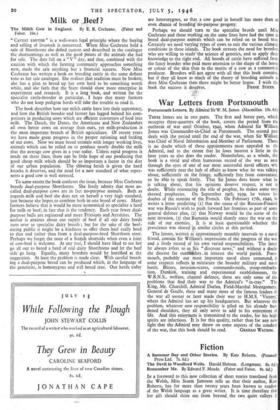War Letters from Portsmouth
Portsmouth Letters. By Admiral Sir W. M. James. (Macmillan. 10s. 6d.) THESE letters are in two parts. The first and better part, which occupies three-quarters of the book, covers the period from the outbreak of war until October, 1942, when Admiral Sir William James was Commander-in-Chief at Portsmouth. The second part deals with the period until the end of the war, when Sir William was Chief of Naval Information and Member of Parliament. There is no doubt which of these appointments most appealed to the Admiral, and to the extent that he loses interest a little in the later years so also does the reader. Nonetheless, as a whole, this book is a vivid and often humorous record of the war as seen through the eyes of one of our most successful naval officers who was sufficiently near the hub of affairs to know what he was talking about, sufficiently on the fringe, sufficiently free from convention, to be able to speak freely. That Sir James does know .what he is talking about, that his opinions deserve respect, is not in doubt. While renouncing the role of prophet, he makes some very shrewd prophecies. On September 19th, 1939, he voices his doubts of the stamina -of the French. On February 17th, :1940, he writes a letter predicting (r) that the cause of the Russian-Finnish war was Russia's wish to push forward her frontiers as part of some general defence plan, (2) that Norway would be the scene of the next invasion, (3) that Rumania would shortly enter the war on the side of our enemies. It is at least questionable whether this prescience was shared in similar circles at this period.
The letters, written at approximately monthly intervals to a naval friend, contain Sir William's impressions of the progress of the war and a lively record of his own varied responsibilities. The latter he always refers to as his " diocesan news," and without a doubt the diocese far outmatches • in interest the world parish. Ports- mouth, probably our, most important naval shore command, in some respects reflects in miniature the broader military and naval battle. Blitzes, invasion-scares, commando-raids, troop-embarka- tion, Dunkirk, training and experimental establishments, the W.R.N.S., welfare, channel defence, these are only some of the problems that find their way to the Admiral's " in-tray." The King, Mr. Churchill, Admiral Darlan, Field-Marshal Montgomery, General de Gaulle, these and many more of the famous leaders of the war all sooner or, later made their way to H.M.S. ' Victory, where the Admiral has set up his headquarters. But whatever the problem, whatever new responsibility is piled on his already bur- dened shoulders, they all only serve to add to his enjoyment of life. And this enjoyment is transmitted to the reader, for his high spirits are infectious. It Is for this quality, rather than for any new light that the Admiral may throw on some aspects of the conduct
of the war, that this book should be read. GRAHAM WATSON.


























 Previous page
Previous page